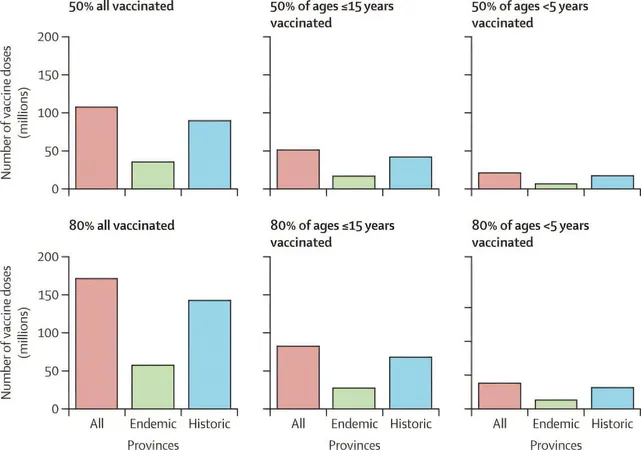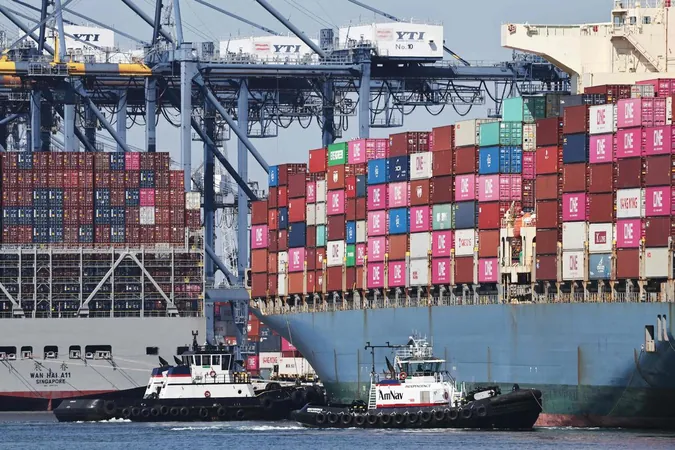
The Urgent Need for Mpox Vaccination in DRC: A Call to Action from Yale Researchers
2024-10-25
Author: Arjun
Background of the Mpox Crisis in DRC
In a groundbreaking study published in The Lancet Global Health, researchers from Yale School of Public Health have highlighted a critical strategy to combat the escalating mpox crisis in the Democratic Republic of the Congo (DRC). They argue that vaccinating children under five in areas heavily affected by mpox could save thousands of lives and significantly reduce the spread of the virus.
Overview of Mpox
Mpox, an infectious disease caused by the monkeypox virus, first emerged in the DRC in 1970. The country saw an unprecedented outbreak in 2023, with over 14,000 reported cases and approximately 700 deaths, predominantly among children. The situation deteriorated in early 2024, with authorities reporting more than 31,000 suspected cases and nearly 1,000 deaths. Alarmingly, many cases remain unaccounted for, as experts estimate that only 41% of infections are officially documented.
WHO Declaration and Urgency
On August 14, 2024, the World Health Organization (WHO) declared the DRC's mpox outbreak a Public Health Emergency of International Concern—a level of alert that underscores the urgency of the situation. The researchers, led by Dr. Gregg Gonsalves and Ph.D. candidate Alexandra Savinkina, developed a mathematical model to evaluate various vaccination strategies in response to this crisis.
Vaccination Strategies Proposed
Their analysis proposed that delivering 10.5 million doses of vaccine to 80% of children under five in endemic areas could reduce mpox cases by 27% and deaths by 43%. A more ambitious plan of vaccinating 80% of all children under 15 in these regions could lead to even greater outcomes, potentially cutting cases by 54% and deaths by 71%. Despite the availability of vaccines, access in the DRC remains critically limited, preventing timely interventions.
Vaccine Availability and Efficacy
The modified vaccinia Ankara vaccine (commonly known as JYNNEOS), which has proven effective in the U.S. and Europe, has not been distributed in the DRC. This vaccine offers up to an 87% protection rate for those who are not immunocompromised, but its absence in the DRC could exacerbate the ongoing health crisis.
Call for Global Attention
Dr. Savinkina emphasized the need for global attention to outbreaks like this, which can be overlooked in more affluent nations. "If the resources to help people exist, we should be using them, whether in the U.S. or in Africa," she stated.
Logistical Challenges
The researchers also raised important logistical challenges regarding vaccine distribution in rural DRC. The nation lacks a robust infrastructure for delivering vaccines, making it difficult to implement even the best-laid plans. "We take for granted that we can get vaccinations at our local pharmacies, but the infrastructure in the DRC is far less developed," Dr. Gonsalves noted.
Limitations of the Study
The study did face certain limitations, as it focused on a single year in its simulations and relied on sparse data about the vaccine's effectiveness over time. There are ongoing uncertainties regarding how long the protection from a single dose will last, a crucial factor for the DRC where multiple doses may be logistically challenging to deliver.
Conclusion and Urgency for Action
In conclusion, the Yale researchers hope their findings will prompt immediate global action to provide essential vaccines to the DRC. With children making up a significant percentage of the mpox cases, prioritizing their vaccination could help reverse this terrifying trend and save countless lives. As the nation struggles against this devastating outbreak, the call for action has never been more pressing—an urgent reminder that the fight against infectious diseases knows no borders.


 Brasil (PT)
Brasil (PT)
 Canada (EN)
Canada (EN)
 Chile (ES)
Chile (ES)
 Česko (CS)
Česko (CS)
 대한민국 (KO)
대한민국 (KO)
 España (ES)
España (ES)
 France (FR)
France (FR)
 Hong Kong (EN)
Hong Kong (EN)
 Italia (IT)
Italia (IT)
 日本 (JA)
日本 (JA)
 Magyarország (HU)
Magyarország (HU)
 Norge (NO)
Norge (NO)
 Polska (PL)
Polska (PL)
 Schweiz (DE)
Schweiz (DE)
 Singapore (EN)
Singapore (EN)
 Sverige (SV)
Sverige (SV)
 Suomi (FI)
Suomi (FI)
 Türkiye (TR)
Türkiye (TR)
 الإمارات العربية المتحدة (AR)
الإمارات العربية المتحدة (AR)